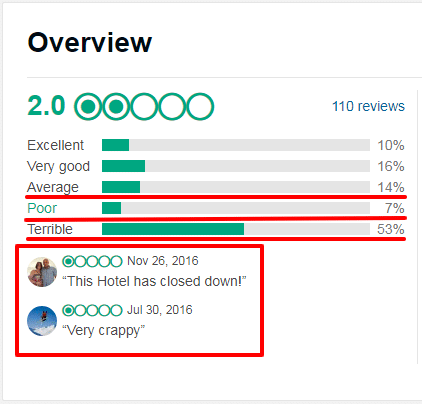Reviews are mandatory.
Research shows great online reviews are a fundamental part of building and maintaining a successful business. You know it. I know it. A strong review portfolio gives prospective customers the data they need to buy.
But what about employees?
Is it possible that your review portfolio has an effect on your business internally? On company morale and employee performance?
Do your reviews work for or against you?
When we think about reviews we typically focus our attention on customers. Will my reviews attract more customers? What do prospects think and feel about my business?
We often neglect our employees.
Most of the time, we aren't focused on the effect our reviews have on our business internally. Many of us think, what's the big deal? I'm not selling to my employees I'm selling to my customers!
But this isn't actually true.
The truth is, as a business owner, manager or leader, we're selling to everyone, all the time.
I'll prove it to you.
Imagine that you're a Googler, someone who works at Google. What do people think about you? They think you're smart, that you're a rare employee. It conveys respect and a little bit of jealousy. If you're a Googler, you're probably proud of that.
Why?
Because of Google's brand perception. They've built and maintained a prestigious brand that's well received by most people, including their customers.
Let's switch things up a bit.
Imagine that you're an employee at the Weinstein company after their career ending scandal. Or Uber after their co-founder was caught on camera yelling at an Uber driver.
How excited are you to share where you work after that?
Here's the part most leaders ignore.
Your failure or success spreads and infects, and the consequences are both internal and external
The perception and public sentiment surrounding your company spreads through your environment. It affects your organization in a variety of subtle ways to either help or hinder your business.
But why?
Why do online reviews affect your business internally?
You're needy.
We're all needy actually. We all have six basic, universal needs. Your business is a proxy, a channel others can use to meet these needs. Let's take a look.
1. Certainty/comfort. We have security, we know what's coming next, life is somewhat predictable. Online reviews, in this context, provide certainty. Awesome reviews show your employees, suppliers, partners and customers that your organization is perceived as trustworthy and reliable. Negative reviews do the opposite.
2. Significance. We achieve significance by doing what others can't, won't or haven't done. Earning lots of money, buying luxurious products or working at prestigious companies with sterling reputations give us significance. We're known by the company we keep.
Zappos, the beloved shoe company, received rave reviews for their legendary customer service. Employee morale, job satisfaction and pride all shot up as a result. Negative reviews reverses this - creating vicarious guilt, shame and fear.
3. Uncertainty/variety. Most people enjoy pleasant surprises. It feeds our need for change, variety and spontaneity. Positive online reviews creates a perpetual stream of positive emotions. This boosts company morale, attracting more A-player employees, partners and opportunities, creating a virtuous cycle of success. Negative online reviews create a vicious cycle of failure, eventually repelling employees, partners and opportunities.
4. Love and connection. At first glance this sounds very touchy-feely. But it's actually quite practical. Your review portfolio is a form of operant conditioning. A negative review portfolio primes customers to give and expect negativity. This decreases morale, motivation and satisfaction as employees are conditioned, by negative reviews, to expect dysfunction and toxicity. A positive review does the reverse.
Why? Expectation states theory states that competence forms the basis for status hierarchies. The more competent your customers feel your organization is, the better your reviews. The better your reviews, the better your status and the more responsive and respectful customers will be to employees. Competence forms the basis of goodwill and connection between employees, vendors, partners and customers.
5. Connection. Who you are (status) and what you give creates meaning. Your online reviews provide connection and meaning to the people associated with your company. Reviews show: Employees they're making a real and significant difference. Partners you're a valuable ally they need to keep. Investors you're providing value to customers which in turn means value for them. Customers that you're valuable, competent and unique.
6. Growth. An amazing review portfolio attracts more customers, that much is obvious. This improves your organization's brand sentiment and perception, improving your company's ability to attract and keep top talent. Negative online reviews do the reverse - ending relationships, repelling partners and deterring backers.
It's easy to take reviews for granted.
To behave as if they're inconsequential or less-than-meaningful. And many organizations do. As we've seen, the consequences are severe.
Wait a minute.
Maybe it's not that bad in reality. Maybe negative reviews don't affect the entire business internally? It does actually, and it's worse than we think it is.
- Marketing sees the impact your company has on customers directly. If the reviews are good, leads and conversions are easier to come by. If reviews are negative, this becomes more difficult over time. Cost per lead/conversion skyrockets as return on ad spend drops.
- Sales teams begin to complain more loudly about the leads they receive. The company’s reputation becomes known. Individual sales reps struggle to close qualified prospects. Reps eventually begin to abandon the company for better opportunities elsewhere. Turnover rates begin to climb as revenue drops.
- Legal receives pressure from sales and marketing as they push for more aggressive content and offers. Legal rejects these ideas in favor of options that are safe and conservative, creating silos and inter-departmental turf wars.
- Human resources struggles to fill positions in departments/key positions. They’re aware of the problems discussed by department heads but they lack the ability or the authority to make any meaningful change. They push for a bigger budget to attract the same number of candidates.
- Customer service reps see a dramatic uptick in complaints, returns and exchanges. Morale falls as customer sentiment becomes fearful, hostile and unfriendly. As the problem escalates support reps begin to leave the company. Support managers request a bigger budget to retain existing support teams.
- Operations receives added pressure from other departments demanding a higher quality product or service. The requests are demanding, require a product or service that costs less, is delivered faster and produces a greater benefit. This requires a significant increase in R&D which finance isn’t all that keen on delivering.
- Finance feels the pressure as department heads lobby for a bigger budget. Marketing needs to spend more to attract a single customer. Sales demands higher commission rates and more reps, etc. Finance pushes back, demanding that department heads justify their existing budgets. Morale falls company wide as animosity and in-group favoritism grows.
- Executives, who are often disconnected from low level changes, hammer department heads for better results. Managers and directors who deliver better results get to keep their jobs. Those who don’t are replaced by “more capable” leaders. The board in turn replaces executives who fail to produce results.
The fallout trickles down.
As public sentiment falls, the damage compounds, spreading silently from department to department. These problems can be profoundly difficult to diagnose, making it all the more likely for staff to excuse away the problem.
It's a miserable position to be in.
And this is with a medium to large business. The fallout with a small business is worse!
Why?
The damage spreads rapidly. These days, a single mistake or social faux pas can bring a small business to its knees. Review platforms like Yelp, Google and TripAdvisor are filled with small businesses that have been crushed by their negative reviews.

Their negative reviews lead to bankruptcy.
Your reviews are a barometer
A way to measure sentiment inside and outside your organization. You know customers are watching but now you know - your employees, partners, vendors and investors - are watching too.
These issues aren't the real problem.
It's the absence of belief. The tendency to discount the impact and importance online reviews have on your business. The internal effects are drastic and far-reaching. Reviews change your business for better or worse.
What if you escape though?
What if you avoid most of the problems I've discussed with you today. Some organizations get away with it. But repeat offenders don't. Not in the long run.
It's a tough pill to swallow.
If you're a business owner or a leader, you've made your fair share of mistakes. This isn't about that. It's about your attempts at making things better. Your attempts to take care of those you serve, whether they're inside or outside your organization.
Do your reviews work for or against you?
You know the answer.
By now you have a clear idea on your review portfolio and the impact it has. You already know reviews are a fundamental part of getting customers to buy. But the rabbit hole goes deeper.
Reviews create and sustain your business.
Your review portfolio keeps trust high. It maintains positive sentiment and goodwill. It preserves your standing in the competitive hierarchy. Reviews give you the tools you need to improve your social standing in your industry and community.
But only if they work for you.
The strategy is simple. Under promise, over deliver. Then ask your customers to spread the word. Share their story with your employees, partners and vendors. Use them to negotiate with investors and financiers.
Promote them.
Share them in your display, social, search and remarketing campaigns. Give the people around you a reason to root for you. Ensure your review portfolio works for you, never against you.
Reviews are a mandatory part of success.
Take a methodical approach to your online reviews and you'll find you have the internal and external momentum your business needs to grow.
Do your reviews work for you?
Not only do reviews help you acquire customers, they're a valuable way to keep your internal culture positive and your employees motivated.
A little bit of external recognition goes a long way. That's where Grade.us comes in. We help your customers share their great experiences with your team of employees! Earn more positive reviews today.
About the Author
Andrew McDermott
Andrew McDermott is the co-founder of HooktoWin. He shows entrepreneurs how to attract and win new customers.









